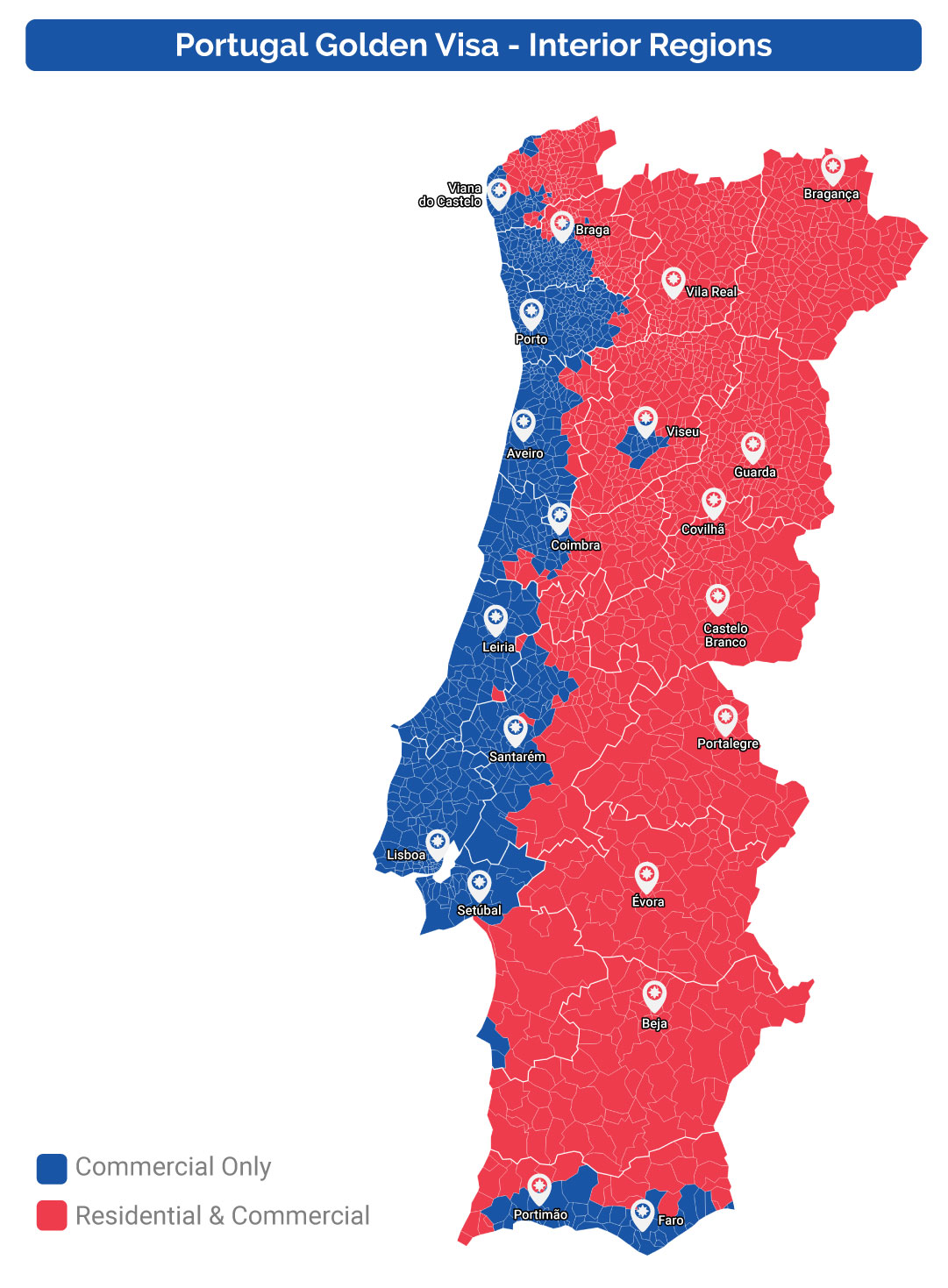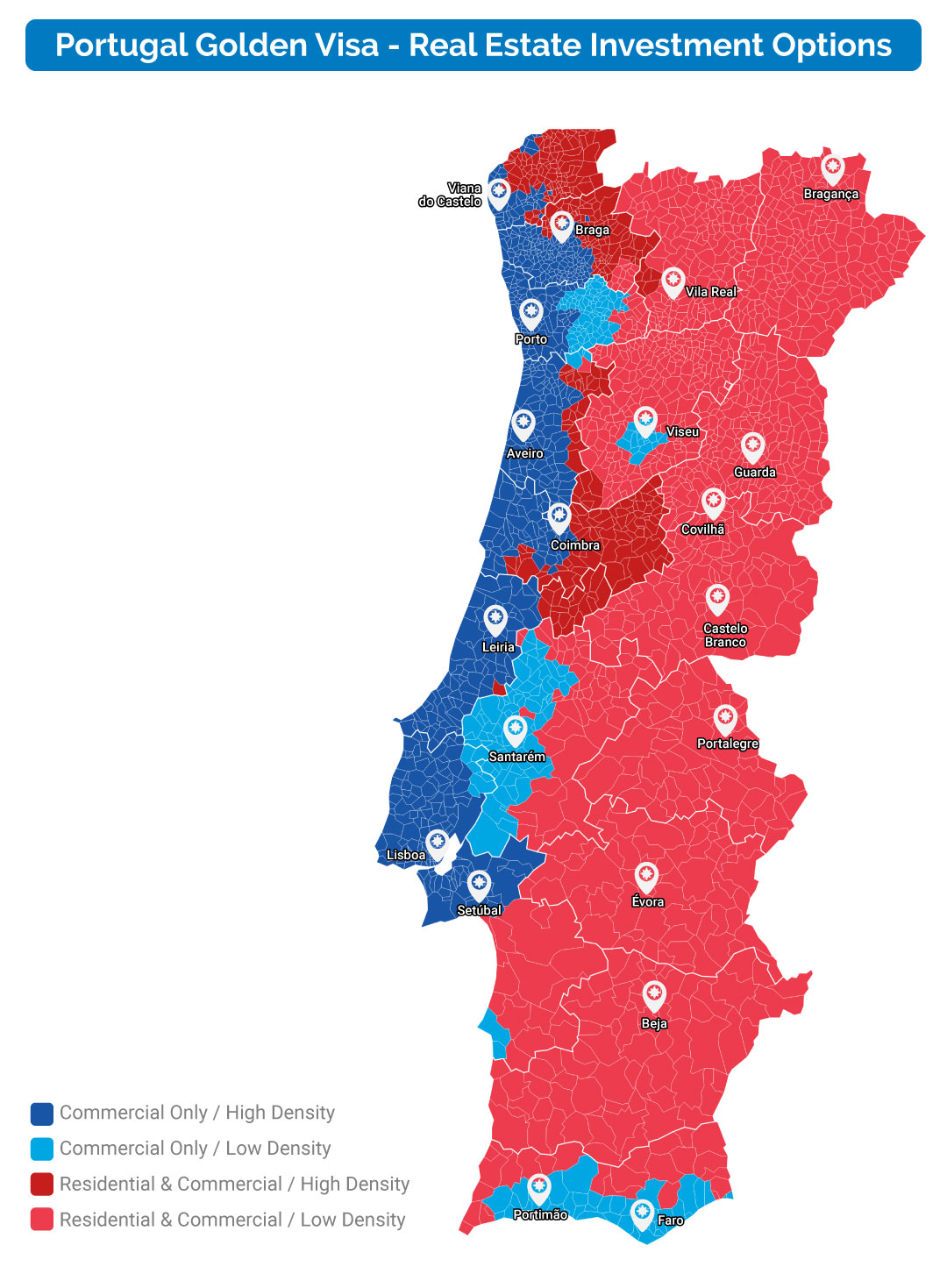However, from 1 January 2022, Portugal introduces new changes to its Golden Visa Program, which will boost interest in interior areas of the country along with the islands.
While the Portugal Golden Visa Program provides several investment routes, including investing a minimum of €500K into residential or commercial property in Portugal or €350K in rehabilitation projects, there are certain location restrictions that apply. Alongside this, price points will vary depending on whether the property is located in a “low density” classified area in Portugal.
Here, we’ll run over the Golden Visa changes and new rules for 2022, specifically for residential real estate investments, and delve into the important differences between interior areas and low-density areas.
Portugal Golden Visa real estate investment options;
The following investment routes are available for the Portugal Golden Visa
-
Purchase residential real estate in a designated interior area of Portugal that is worth at least €500,000 (or €350,000 if investing in a rehabilitation project). If the residential property is in a designated “low density” area, then a 20% discount will apply.
-
Purchase commercial real estate anywhere in the country that is worth at least €500,000 (or €350,000 if investing in a rehabilitation project). If the commercial property is located in a designated “low density” area, then a 20% discount will apply.
-
Purchase residential and commercial real estate anywhere in the autonomous islands of Madeira and the Azores, that is worth at least €500,000 (or €350,000 if investing in a rehabilitation project). The entire islands of Madeira and the Azores are classified as high density, so a discount is not applicable when investing in the islands.
What areas of Portugal are eligible for the Golden Visa?
The Portuguese government is looking to foster and promote investments in the following areas:
-
Low-density areas
-
Urban requalification
-
Cultural heritage
-
Activities of high environmental and social value
-
Job production and productivity
The Portuguese authorities have amended the real estate investment routes to account for this, by creating a classification system of what areas investors can invest in. These areas are called “interior” and “low density”. It is important to note that these are very different terms.
Here, we will run over these different terms, to provide you with a clear understanding of each.
Interior areas:
Interior areas are areas where you can make a residential real estate investment to qualify for the Portugal Golden Visa.
For commercial real estate, you can invest anywhere in the country and there are no location restrictions in place (if the property is classified as “commercial”).
The map below highlights Portugal’s interior regions (highlighted in red). Note that properties that belong to “interior” Portugal qualify for residential AND commercial real estate investment. Only commercial properties can be purchased outside the “interior” parameters (highlighted in blue).

Low-density areas:
The regions that are classified as low-density are shown in light gray in the map below. The areas that are classified as high-density are shown in dark gray.
When an area is deemed “low-density” it means a 20% discount rate will apply to your investment Low-density regions are defined as territorial units (NUTS II) and have less than 100 inhabitants per square km or a GDP per capita that is 75% or less than the national average.

While interior areas and low-density areas share a lot of overlapping ground, it is possible for an area to be both interior and high-density. If this is the case, then you can purchase a residential property, but no discount will apply.
As an example, you will not be able to invest in residential real estate in some parts of the Algarve for the Portugal Golden Visa. While it is classified as a low-density area, it is not considered to be a completely interior part of the country. Some areas in the Algarve are, however, considered to be low density and interior, such as Aljezur, Odeceixe, and Sagres. In these areas, you will be able to buy a residential property or invest in a residential rehabilitation project while taking advantage of a 20% discount on your investment.
The map below provides an overview of the areas of Portugal that are eligible either for:
-
High-density property investment in non-interior areas (commercial only).
-
Low-density real estate investment in non-interior areas (commercial only, 20% discount applies).
-
High-density property investment in interior areas (residential and commercial).
-
Low-density property investment in interior areas (residential and commercial, 20% discount applies).

Investors are able to purchase a residential property that falls under both the categories of a “low-density” and “interior” area in Portugal. Some properties that will qualify for the Golden Visa will even be in areas that have a high-growth potential – such as the Douro Valley, Aljezur, and Peneda Gerês. These areas have excellent opportunities for tourism and hospitality and are likely to become increasingly popular in the coming years.
Each of these offers excellent, spacious properties that are very good value for money. You will be able to find properties with a private swimming pool and large areas of land for roughly €400K.
|
Reselling chances |
Prices per m2 |
Prices fluctuation |
Tourism industry |
Renting returns |
Tourism returns |
|
|
Peneda Gerês |
Medium |
Low |
Low |
High |
Low |
High |
|
Douro Valley |
Medium |
Medium |
Low |
Medium |
Low |
Medium |
|
Aljezur |
High |
High |
Low |
High |
Medium |
High |
The Golden Visa changes for 2022, with regards to real estate, will diversify the foreign investment pool across the country. Investors will delight in finding hidden gems off the beaten path, many of which have high growth potential.
The 20% discount that applies in many residential areas (i.e. that are categorised as being both interior and low-density) is a very attractive draw for investing in the Portugal Golden Visa, which looks set to continue to be one of the most popular residency-by-investment programs in the world.
















These programs promote a domestic politics of haves and have nots. The real estate speculation in Lisboa and Porto has left many families without the ability to own a home. The immigrants who want to return cannot afford homes. The reality is that Portugal is selling itself to foreigners and the rich. This will create resentment.
By E Dias from USA on 08 Jan 2022, 15:41
Mr. Dias is misguided in his assessment of the puchasing power of returning Portuguese emigrants especially those who migrated to Britain, made successes of their careers from humble beginnings and now, because of Brexit, have sold their homes and are re-investing for retirement in Portugal. In many cases they have acquired capital in excess of €1,000,000 but this should not be confused with the inflation of prices in Lisbon and Porto which has been caused by speculation on the part of wealthy foreigners whose reasons for acquiring Portuguese nationality are often dubious.
By Cavaleiro R. from Other on 09 Jan 2022, 09:33
These maps are outdated or just incorrect. For example low/high density areas are determined by NUTS III area, not municipality like has been done here.
By Mark from Lisbon on 11 Jan 2022, 17:01